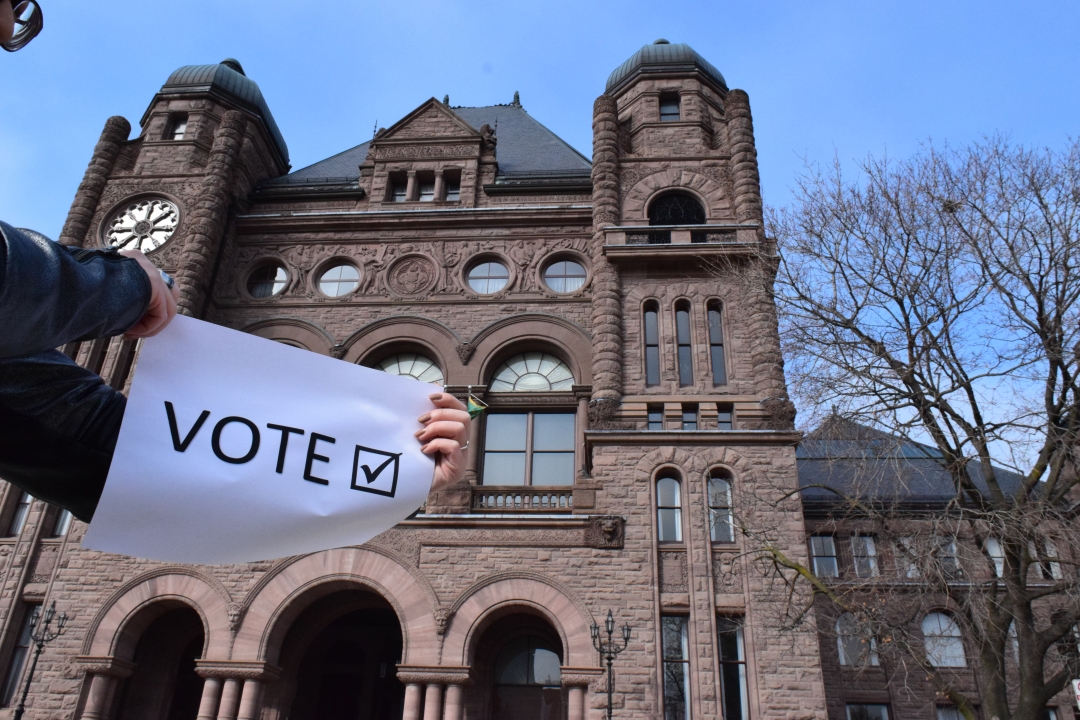U of T and the UTSU have both expressed disappointment about Elections Canada’s announcement that it will not run the Vote on Campus program in the coming federal election, meaning that voting stations will not be available on campuses.
The decision to cancel campus polling stations was initially made in the fall of 2020. Elections Canada defended the decision, explaining that the cancellation was due to the COVID-19 pandemic and the Liberals’ minority government.
A U of T spokesperson wrote that the Vote on Campus program had been an “essential vehicle” of students’ civic participation and has made it easier for students to vote. They added that the university would provide resources to support students casting their ballots despite the program’s cancellation.
UTSU President Alexa Ballis wrote to The Varsity that the cancellation of the Vote on Campus program would add barriers for students to voting in the coming election. She said that the program had raised voter turnout amongst students in the past.
Reasoning and U of T’s response
In an email to The Varsity, Elections Canada representative Dugald Maudsley noted that the decision not to have an on-campus voting option was not a new one but rather an extension of last year’s decision.
“Elections Canada faced two key challenges: the pandemic and the context of a minority government,” Maudsley wrote. He explained that the minority government made it difficult to provide university administrators with a clear timeline for when they would need to secure the required space and hire election officials, a process that normally takes six to eight months.
Maudsley added that many universities’ decisions to mandate vaccination at on-campus voting sites would complicate Elections Canada’s goal to make voting as accessible and safe as possible.
“As soon as the decision was taken, we worked with student organizations to make sure students were aware of their voting options,” Maudsley noted. He added that they encourage students to vote early if possible.
A U of T spokesperson expressed the university’s disappointment at Elections Canada’s decision to cancel the on-campus voting program. “We believe the program served as an essential vehicle for student civic participation, particularly through the special ballot and advance voting opportunities which allowed students from other electoral districts across the country to cast their ballots more easily,” they wrote in an email to The Varsity.
The university concluded that, despite Elections Canada’s decision, it would still be holding several voting-related events, including a social action day and the Twitter campaign #UofTVotes.
Student reactions
In an email to The Varsity, Ballis wrote that students are already stressed about returning to campus and that meeting the application deadline for a special ballot makes their transition even more stressful. She added that students might be unable to meet the deadline and therefore might not be able to vote.
“For students who don’t live in Toronto, it is added stress to ensure they apply for a special ballot by September 14th in order to vote and have their voices heard. This is further exacerbated by how it is already stressful as folks are navigating the return to campus,” wrote Ballis.
An online petition titled “Elections Canada: Open Voting Booths and Special Balloting on Campus!” calls on Elections Canada to reconsider their decision and set up voting booths on campus again. The petition has garnered over 21,000 signatures.
“Students and youth are an integral demographic to include in our democratic system. With already busy schedules and living situations often far from home, students need the Vote on Campus program in order to have fair access to the democratic process,” reads the petition.
Esmé Decker, a second-year undergraduate student from the University of British Columbia, is the petition’s organizer. They said the decision not to offer the on-campus voting program shocked them, since it successfully increased the turnout rate among young voters in both the 2015 and 2019 elections.
“Every election that passes, the more the youth vote matters, because these are the people inheriting the world’s problems — especially time-sensitive ones like the climate crisis,” said Decker. “That gets worse by the season, not to mention by the year. So the youth vote is especially important for those issues.”
Decker said they were surprised to learn that the program was cancelled long before the election was called. “It’s so surprising because then their claims about it being rushed, and [that] they don’t have time to put it together — if they’ve been thinking about it for a year or more, it just rubs me the wrong way,” said Decker.
Decker said that they hope the petition shows Elections Canada that people value the option to vote on campus and gives people the opportunity to act on those values.
“The [Vote on Campus] program for sure needs to be implemented for future elections, if not this one. It’s really great to see how much support there is for youth voting in this country,” said Decker.


